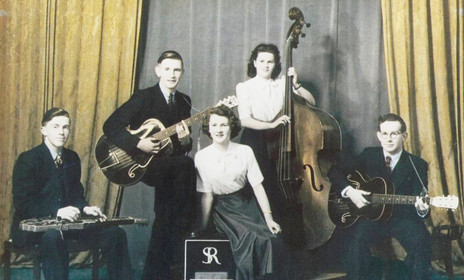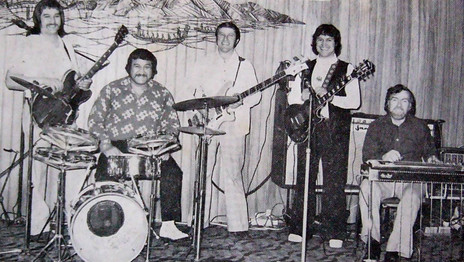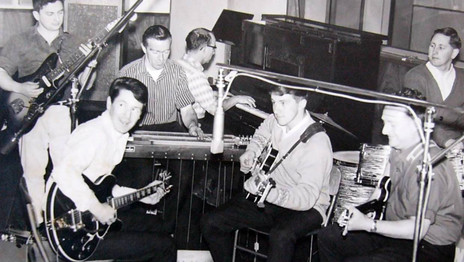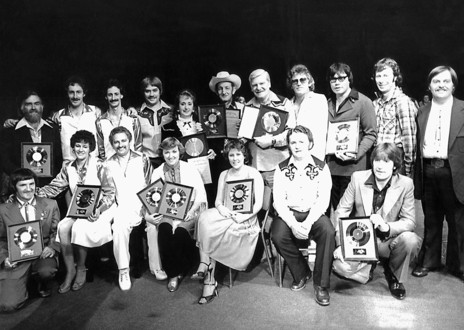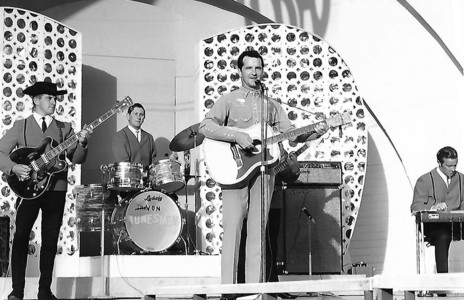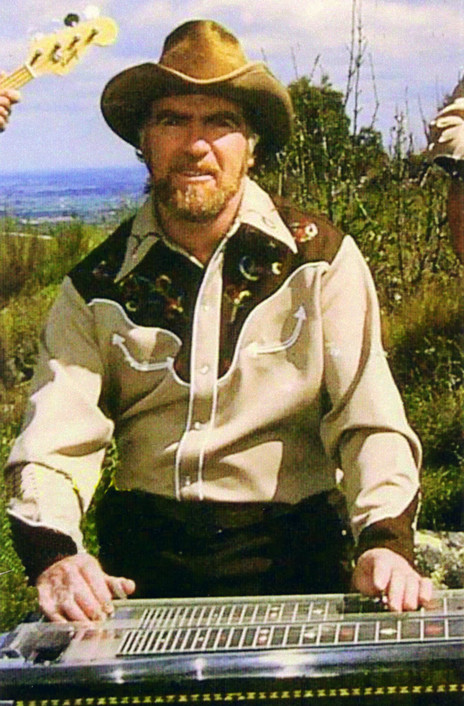He was well travelled, serving a stint as the pedal-steel guitarist for Māori showband The Quin Tikis, and he was a reliable go-to tour band member for promoter Joe Brown’s Country and Western Shows and Miss New Zealand tours.
He recorded on albums for many prominent New Zealand artists, but only two stand out in Thomas’s mind – My Kind Of Pickin’, by Peter Posa, in 1966, and his personal favourite, Trucks and Trains, by Noel Parlane, in the early 1980s. As direct in conversation as he was precise and expressive on a pedal-steel guitar, the straight-shooting Thomas says he played on plenty of albums “that didn't impress me too much” but “I would recommend that one if you can get your hands on a copy of it”.
The prolific musician only ever recorded one album under his own name, Steel Guitar Country, recorded around 1979 on the Music World label with his eponymous band, Les Thomas & The Countrymen.
It includes a lively cover of Bob Wills and His Texas Playboys’ seminal steel-guitar track, ‘Steel Guitar Rag’, and a yearning rendition of what would become Thomas’s signature tune, ‘Pleading’. Both tracks highlight Thomas’s sure, smooth slide technique and buttery tone.
In a career spanning more than 60 years, countless live shows and recording sessions, Thomas never learned to read music.
A printer by trade, Thomas’s lifelong association with the pedal-steel guitar began as a young teenager when he heard the instrument being played on the radio on records by Hank Snow and Hank Williams.
His earliest attempts to emulate that haunting sound were made on a home-built lap guitar “with bits of sticky paper for frets and Anchor milk tins polished up like chrome” to make it look good. He told the Southland Times he used that until he’d saved up enough money to buy a pedal steel.
Entirely self-taught, he says he struggled playing his home-made lap guitar in a group called the Southern Ramblers and discovered the technique and tuning by trial and error.
“I didn’t know anything about music,” he told the newspaper in 2015. “Anything I’ve learned to this day I sort of found out for myself. If it didn't sound right, I’d look for the right thing.”
“They liked it and they kept calling us back for more broadcasts.”
His first experience of playing live broadcasts was for Invercargill radio station 4YZ with the Southern Ramblers in 1953, when he was 16 or 17. Thomas recalls that as “an adventure”. The red light would go on in the studio and the band would start playing.
“We couldn't play for shit, but they liked it and they kept calling us back for more broadcasts,” Thomas says.
The live broadcasts continued for two or three years until Thomas was called up for compulsory military training. After that he temporarily moved to Australia.
When he returned to Invercargill, he was recruited to play some Hawai’ian music broadcasts in a group that included Graeme Gorton, who would later become a renowned opera singer.
Through that group Thomas met fellow Invercargill musicians Gordon Mills, Bruce Rennie and Neville Toshach, who along with Thomas's younger brother Colin and Angus Buchanan would become the Tunesmen.
They picked up where the earlier bands had left off, playing live radio shows and backing other artists in shows around Invercargill.
After one such show, the Tunesmen were blowing off some steam at a party at pianist Bruce Rennie’s house when Peter Posa arrived. The New Zealand chart-topping guitarist was on one of his many national tours and had gone looking for local musicians to hang out with. The ensuing jam session left such an impression on Posa that he recommended the Tunesmen to Joe Brown.
That was Thomas’s introduction to the New Zealand major league. He and the Tunesmen soon found themselves on tour as the backing band for popular local performers Howard Morrison, John Hore (later John Grenell) and Paul Walden.
In 1966, while playing on another of Joe Brown’s Country and Western tours, the Tunesmen had a weekend off in their hometown and went into Invercargill’s 4ZA studio to record Peter Posa’s My Kind Of Pickin’ album, their first recording session.
“It was all off the cuff,” Thomas told the Southland Times. “Most of the tracks on it were just first take. That’s how good we were going. We were playing every day for about six weeks on that tour, so we became quite a nice tight unit.”
Brown invited the Tunesmen to return for another tour but only Thomas was available, and he found himself playing pedal-steel guitar for the Quin Tikis.
Thomas thinks he did about six or seven of Joe Brown’s Country and Western tours, and another three of his Miss New Zealand tours.
By the 1970s Les Thomas was a seasoned performer on national stages.
Working with Howard Morrison on those tours was “sure an education,” he told the Southland Times. “It used to scare the pants off me to go on stage in public with the big guy, but I'll tell you what, I'm so glad [I did]. I learned a lot from him.”
By the 1970s Thomas was a seasoned performer on national stages.
Back in Southland, he gave his name to the band Les Thomas and the Countrymen, with brother Colin Thomas on bass, Maaki Goodwillie and Robert Paraki on guitar and vocals, and a series of drummers: Kevin Mahoney, Gavin Piercy and Bill Tipu.
Thomas says they were, “flying high without flying … I think we were the busiest band in Invercargill.”
They would play three nights a week, then in summer they would head out on the South Island carnival circuit. “It was a good way to pay for a holiday,” Thomas recalls.
The band secured regular gigs supporting international touring artists including Burl Ives, Susan Raye (‘LA International Airport’) three times, Australian country music queen Jean Stafford, Rex Dallas, the Webb Brothers and Slim Dusty, as well as New Zealand stars such as Suzanne Prentice.
Les Thomas and the Countrymen were the backing band for the first eight years of the New Zealand Gold Guitar Awards at Gore, from 1974 until 1981.
In 2004, Thomas’s sterling contribution to New Zealand country music was recognised when he was inducted in the Gore Country Music Club’s Hands of Fame, a year before two of the artists he had played with many times – Peter Posa and John Grenell.
Thomas was inducted in the Southland Musicians Club Southland Rock and Roll Hall of Fame in 2015.
